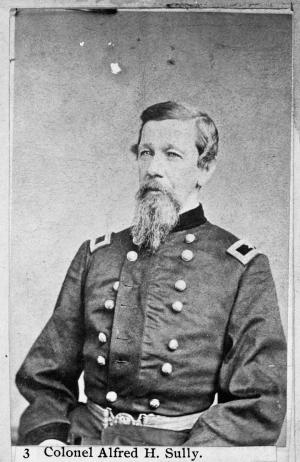 "I believe I can safely say I gave them one of the most severe punishments that the Indians have ever received."
"I believe I can safely say I gave them one of the most severe punishments that the Indians have ever received."
General Sully speaking about Whitestone Hill
Alfred H. Sully was born in 1821 in Pennsylvania. He graduated from West Point in 1841. During and after the American Civil War, Sully served in the Plains States and was widely regarded as an Indian fighter. Sully, like his father, was a watercolorist and oil painter. Between 1849 to 1853, he became chief quartermaster of the U.S. troops at Monterey, California, after California came under American jurisdiction.
During the Civil War, Sully commanded brigades at such battles as the Seven Days, Fredericksburg, and Chancellorsville, and eventually rose to the rank of brevet major general of volunteers. Being known as a successful "Indian fighter," Sully was transferred west to aid in the aftermath of the U.S.-Dakota War, and was commissioned colonel of the First Minnesota Volunteer Infantry on February 3, 1862. He served in that rank until promoted to brigadier general on September 26, 1862.
Serving under General Pope, Sully's job was to command cavalry troops in the "Indian Wars." From 1863 to 1866 he commanded the "North Western Indian Expeditions" directed against the Arapaho, Sioux, and Cheyenne. Notable battles were White Stone Hills and Tahkahhakuty (or Killdeer Mountain). On September 3, 1863, at Whitestone Hill, Dakota Territory, as reprisal for the Dakota Conflict of 1862, his troops destroyed a village of some 500 tipis that lodged Yankton, Dakota, Hunkpapa Lakota, and Blackfeet. Men, women, and children were killed or captured. The troopers' casualties were small. One of Sully's interpreters, Samuel J. Brown, a mixed-blood Sioux, said "it was a perfect massacre" and "lamentable to hear how those women and children was massacred."
Due to the poor condition of his horses and mules and his lack of supplies, Sully was unable to keep pursue the Dakota He left Whitestone Hill on September 6 and marched his men to Fort Pierre in present day South Dakota. He built Fort Sully, and after spending the winter at the fort, renewed operation in 1864 against the Dakota and instigated the Battle of Killdeer Mountain.
Sully died in 1879.
Sully, Langdon. No Tears for the General: The Life of Alfred Sully, 1821-1879. Palo Alto: American West Publishing Company, 1974




